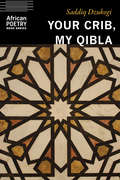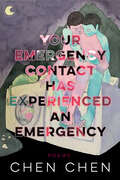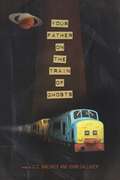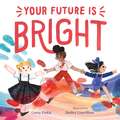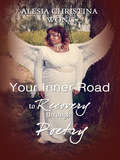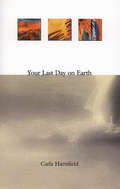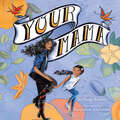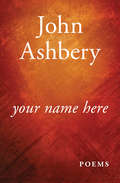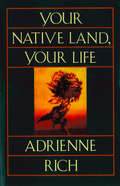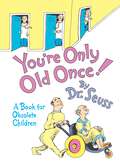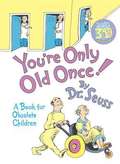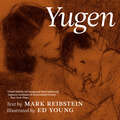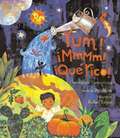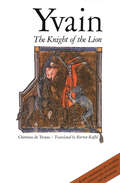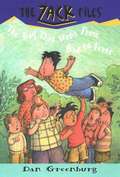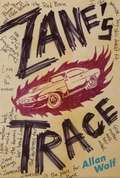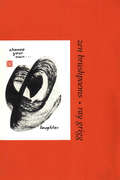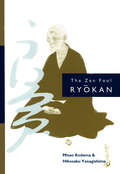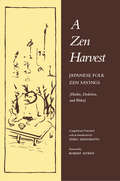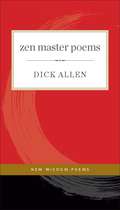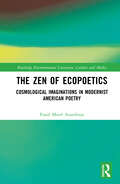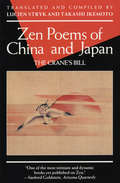- Table View
- List View
Your Crib, My Qibla (African Poetry Book)
by Saddiq DzukogiYour Crib, My Qibla interrogates loss, the death of a child, and a father&’s pursuit of language able to articulate grief. In these poems, the language of memory functions as a space of mourning, connecting the dead with the world of the living. Culminating in an imagined dialogue between the father and his deceased daughter in the intricate space of the family, Your Crib, My Qibla explores grief, the fleeting nature of healing, and the constant obsession of memory as a language to reach the dead.
Your Emergency Contact Has Experienced an Emergency (American Poets Continuum Series #194)
by Chen ChenWhat happens when everything falls away, when those you call on in times of need are themselves calling out for rescue? In his highly anticipated second collection, Chen Chen continues his investigation of family, both blood and chosen, examining what one inherits and what one invents, as a queer Asian American living through an era of Trump, mass shootings, and the COVID-19 pandemic. Always at work in the wrecked heart of this new collection is a switchboard operator, picking up and connecting calls. Raucous 2 a.m. prank calls. Whispered-in-a-classroom emergency calls. And sometimes, its pages record the dropping of a call, a failure or refusal to pick up. With irrepressible humor and play, these anarchic poems celebrate life, despite all that would crush aliveness. Hybrid in form and set in New England, West Texas, and a landlocked province of China, among other places, Your Emergency Contact Has Experienced an Emergency refuses neat categorizations and pat answers. Instead, the book offers an insatiable curiosity about how it is we keep finding ways to hold onto one another.
Your Father on the Train of Ghosts (American Poets Continuum #126.00)
by John Gallaher G.C. WaldrepYour Father on the Train of Ghosts is one of the most extensive collaborations in American poetry. Over the course of a year, acclaimed poets G.C. Waldrep and John Gallaher wrote poems back and forth, sometimes once or twice a week, sometimes five or six a day. As the collaboration deepened, a third "voice" emerged that neither poet can claim as solely their own.The poems of Your Father on the Train of Ghosts read as lyric snapshots of a culture we are all too familiar with, even as it slips from us: malls and supermarkets, museums and parades, toxic waste and cheesecakes, ghosts and fire, fathers and sons. Ultimately, these fables and confessions constitute a sort of gentle apocalypse, a user-friendly self-help manual for the end of time.G.C. Waldrep is author of Goldbeater's Skin (2003 Colorado Prize for poetry), Disclamor, and Archicembalo (2008 Dorset Prize). He has won awards from the Poetry Society of America and Academy of American Poets, fellowships at Yaddo and the MacDowell Colony; and an NEA fellowship. He holds an MFA in poetry from the Iowa Writers' Workshop and teaches at Bucknell University.John Gallaher is author of Gentlemen in Turbans, Ladies in Cauls, The Little Book of Guesses (Levis Poetry Prize), and Map of the Folded World. His poetry has been included in The Best American Poetry series and numerous journals and anthologies. He co-edits The Laurel Review, GreenTower Press, and the Akron Series of Contemporary Poetics. He teaches at Northwest Missouri State University.
Your Father on the Train of Ghosts
by G. C. Waldrep John GallaherYour Father on the Train of Ghosts is one of the most extensive collaborations in American poetry. Over the course of a year, acclaimed poets G.C. Waldrep and John Gallaher wrote poems back and forth, sometimes once or twice a week, sometimes five or six a day. As the collaboration deepened, a third "voice" emerged that neither poet can claim as solely their own.The poems of Your Father on the Train of Ghosts read as lyric snapshots of a culture we are all too familiar with, even as it slips from us: malls and supermarkets, museums and parades, toxic waste and cheesecakes, ghosts and fire, fathers and sons. Ultimately, these fables and confessions constitute a sort of gentle apocalypse, a user-friendly self-help manual for the end of time.G.C. Waldrep is author of Goldbeater's Skin (2003 Colorado Prize for poetry), Disclamor, and Archicembalo (2008 Dorset Prize). He has won awards from the Poetry Society of America and Academy of American Poets, fellowships at Yaddo and the MacDowell Colony; and an NEA fellowship. He holds an MFA in poetry from the Iowa Writers' Workshop and teaches at Bucknell University.John Gallaher is author of Gentlemen in Turbans, Ladies in Cauls, The Little Book of Guesses (Levis Poetry Prize), and Map of the Folded World. His poetry has been included in The Best American Poetry series and numerous journals and anthologies. He co-edits The Laurel Review, GreenTower Press, and the Akron Series of Contemporary Poetics. He teaches at Northwest Missouri State University.
Your Future Is Bright
by Corey FinkleCelebrate the boundless possibilities of the future with this uplifting picture book about the potential in every child, perfect for fans of Oh, the Places You’ll Go! and The Wonderful Things You Will Be.Today is a triumph! It’s awesome! You’re great!The things you’ve accomplished are truly first rate.Your efforts have made you stand out from the crowd,So, puff out your chest—you deserve to feel proud.Follow a group of children as they dream about what the future might hold. As they spin their passions into opportunities, they learn that adventure awaits any and all who put their hearts and minds into something.Told in Corey Finkle's touching rhyming verse and paired with gorgeous watercolor illustrations by Shelley Couvillion, Your Future Is Bright is an inspiring ode to self-confidence, kindness, and dedication, and makes for the perfect gift for any occasion, including graduations, baby showers, birthdays, and more.
Your Inner Road to Recovery through Poetry
by Alesia Christina WongThis book of Poetry has been written because of some of the most unfortunate circumstances that occur in the life of the writer. In this book of poetry you will experience encouragement, restoration and a push to keep dreaming no matter what the circumstances offer in life. Alesia Christina Wong is no ordinary seventeen-year-old young lady. She was born in 1999. She is young in age but old in maturity and knowledge. She is 'blessed 'to be the only child of her parents and believes in her dreams and passions. A firm believer in Jesus Christ, she is a proud spiritual daughter of Bishop Robin and Lady Veronica Dinnanauth. She credits her spiritual father, Bishop Robin, for pushing her to her full potential in putting together this book and more to come.
Your Last Day on Earth
by Carla HartsfieldLonglisted for the 2004 ReLit Awards Carla Hartsfield sings praises to the unusual: a rose blooming in December; an angel dancing on a cardiologist's scanner; Glenn Gould playing Brahms at Angelo's Garage. But these are common occurrences in Your Last Day on Earth, the everyday world and the metaphysical realm sharing the same ecstatic poem. Hartsfield transforms the contents of her psyche into music that we can all hear, the kind that replays for days in the dark, dreamy parts of our selves.
Your Mama
by NoNieqa RamosA sweet twist on the age-old “yo mama” joke, celebrating fierce moms everywhere with playful lyricism and gorgeous illustrations, Your Mama is an essential Mother’s Day read.Yo’ mama so sweet, she could be a bakery. She dresses so fine, she could have a clothing line. And, even when you mess up, she’s so forgiving, she lets you keep on living.Heartwarming and richly imagined, Your Mama twists an old joke into a point of pride that honors the love, hard work, and dedication of mamas everywhere.A Kirkus Prize FinalistKirkus Most Joyous Picture Book of 2021School Library Journal Best Picture Books of 20212022 NCTE Notable Books in Poetry2021 Nerdy Book Club AwardVirginia Center for the Book Great Read 2021
Your Name Here: Poems
by John AshberyA mesmerizing, endlessly entertaining collection that shows John Ashbery at his most exuberant, honest, and inviting John Ashbery&’s nineteenth original collection of poetry, first published in 2000, might be one of the &“Ashberyest&” of his long and varied career. In these poems, the slippery pronouns (who is speaking, who is being spoken to?), the high-low allusions (Daffy Duck, please meet Rimbaud), and the twists of context (where are we anyway, and what&’s happening here?) that have long been hallmarks of Ashbery&’s poetry are on full, rambunctious display. Beginning with the book&’s very title, Ashbery invites the reader into the world of his poetry like never before; each poem can be read as a postcard to experiences that could be yours, his, or anyone&’s. And yet the poems in Your Name Here are also personal and particular. The collection is dedicated to an old friend, and in the well-known &“History of My Life,&” Ashbery strikes a rare autobiographical chord. Some of the best-known poems of Ashbery&’s later career are here, including &“Not You Again,&” &“Crossroads in the Past,&” and &“They Don&’t Just Go Away, Either.&” Polyphonic, deeply honest, and frequently very funny, Your Name Here is both wonder filled and wonderful.
Your Native Land, Your Life
by Adrienne RichA major American poet faces her own native land, her own life, and the result is a volume of compelling, transforming poems. The book includes two extraordinary longer works: the self-exploratory "Sources" and "Contradictions--Tracking Poems," an ongoing index of an American woman's life. The poet writes, "In these poems I have been trying to speak from, and of, and to, my country. To speak of a different claim from those staked by the patriots of the sword; to speak of the land itself, the cities, and of the imaginations that have dwelt here, at risk, unfree, assaulted, erased. I believe more than ever that the search for justice and compassion is the great wellspring for poetry in our time, throughout the world, though the theme of despair has been canonized in this country. I draw strength from the traditions of all those who, with every reason to despair, have refused to do so."
You're Only Old Once!: A Book for Obsolete Children (Classic Seuss)
by Dr. SeussJoin in on the fun (and funny) journey of getting older with this hilarious Dr. Seuss picture book—it&’s just what the doctor ordered for new retirees, old souls, and kids at heart--and makes a perfect gift to celebrate birthdays and other milestones!" The Doctor is in...Dr. Seuss that is! Readers will laugh along with the parade of medical madness as an elderly patient is poked, prodded and ogled during his stay at the &“Golden Years Clinic on Century Square for Spleen Readjustment and Muffler Repair.&” Once again, Dr. Seuss proves that his sharp wit and colorful imagination are a treat for readers of all ages. A perfect gift for retirement, birthdays, graduations, holidays, and anyone needing a little pick-me-up after a doctor&’s visit!
You're Only Old Once!
by Dr SeussYou're Only Old Once! Is this a children's book? Well... not immediately. You buy a copy for your child now and you give it to him on his 70th birthday. If laughter is the best medicine, then You're Only Old Once! is a delightful new defense against aging. Anyone who has ever submitted to a battery of medical tests will empathize with Dr. Seuss's Everyman in this wry book. In it we follow our hapless hero through his checkup with the experts at the Golden Years Clinic. From the initial Eyesight and Solvency Test HAVE YOU ANY IDEA HOW MUCH MONEY THESE TESTS ARE COSTING YOU? --through all the stops along Stethoscope Row to finally being "properly pilled" and "properly billed," Dr. Seuss lightens the aches and pains of growing old with his inimitable wit and wisdom. While you're waiting for your child to turn 70, why not test-run You're Only Old Once! on an obsolete child now?
Yugen
by Mark ReibsteinTold in haiku-based American Sentences and pictures, Yugen is the story of a boy and his mother, inspired by the profound concept of "yugen," a Japanese word for the mystery and beauty of the universe and of human experience. The second collaboration between Caldecott-winning illustrator Ed Young and Mark Reibstein after their award-winning 2008 debut, Wabi Sabi, Yugen is a book of longing and remembrance that is unequaled in its beauty and poetic simplicity.
Yum! Mmmm! Que Rico!
by Pat Mora Rafael López"From blueberries to vanilla, indigenous foods of the Americas are celebrated in this collection of haiku, which also includes information about each food's origins"--Provided by publisher.
Yvain
by Chretien De TroyesThe twelfth-century French poet Chrétien de Troyes is a major figure in European literature. His courtly romances fathered the Arthurian tradition and influenced countless other poets in England as well as on the continent. Yet because of the difficulty of capturing his swift-moving style in translation, English-speaking audiences are largely unfamiliar with the pleasures of reading his poems.Now, for the first time, an experienced translator of medieval verse who is himself a poet provides a translation of Chrétien's major poem, Yvain, in verse that fully and satisfyingly captures the movement, the sense, and the spirit of the Old French original. Yvain is a courtly romance with a moral tenor; it is ironic and sometimes bawdy; the poetry is crisp and vivid. In addition, the psychological and the socio-historical perceptions of the poem are of profound literary and historical importance, for it evokes the emotions and the values of a flourishing, vibrant medieval past.
The Zack Files #20: How I Went from Bad to Verse
by Dan GreenburgZack goes on a class trip, gets an insect bit, and suddenly can't speak a single word that isn't in rhyme. Talking like a modern-day Shakespeare may be fun at first, but not when you can't turn it off! What could be verse? How did this happen? And how can Zack make it stop?
Zane's Trace
by Allan WolfZane Guesswind has just killed his grandfather--or so he believes. Stealing a car, Zane takes off on a manic trip to his mother's grave, intent on killing himself. Along the way, Zane gets farther from the life he knows--but closer to figuring out who he is.
Zen Brushpoems
by Ray GriggZen Brushpoems connects the creative insights of Haiku-like poetry with the dynamic interplay of the written word and painted image. This subtle and profound medium of poetic expression has been inspired by the revolutionary work of Paul Reps
Zen Brushpoems
by Ray GriggZen Brushpoems connects the creative insights of Haiku-like poetry with the dynamic interplay of the written word and painted image. This subtle and profound medium of poetic expression has been inspired by the revolutionary work of Paul Reps
Zen Brushpoems
by Ray GriggZen Brushpoems connects the creative insights of Haiku-like poetry with the dynamic interplay of the written word and painted image. This subtle and profound medium of poetic expression has been inspired by the revolutionary work of Paul Reps
The Zen Fool Ryokan
by Misao Kodama Hikosaku YanagashimaRyokan's poems are celebration of the joys and sadnesses of everyday life. His spare, direct style is remarkable for its immediacy and intimacy. This bilingual collection contains more than 150 of his finest poems in Japanese and Chinese, including his famous lyrical correspondence with the nun Teishin, who befriended him in his later years. It also includes a biographical essay on Ryokan, and useful notes on the poems themselves.
A Zen Harvest
by Soiku ShigematsuOne of the vital aspects of traditional Rinzai Zen koan study in Japan is jakugo, or capping-phrase exercises. When Zen students have attained sufficient mastery of meditation or concentration, they are given a koan (such as the familiar "What is the sound of one hand clapping?") to study. When the student provides a satisfactory response to the koan, he advances to the jakugo exercise-he must select a "capping phrase," usually a passage from a poem among the thousands in a special anthology, the only book allowed in the monastery. One such anthology, written entirely in Chinese, was translated by noted Zen priest and scholar Soiku Shigematsu as A Zen Forest: Sayings of the Masters. Equally important is a Japanese collection, the Zenrin Segoshu, which Mr. Shigematsu now translates from the Japanese, including nearly eight hundred poems in sparkling English versions that retain the Zen implications of the verse.
Zen Master Poems
by Dick AllenA unique voice in American poetry evocative of Han Shan's Zen verses, Pablo Neruda's Book of Questions, and the writings of Jack Kerouac.What a long conversation we never had! All those rivers? we never crossed together. You so busy with your own life, I so busy with mine. Dick Allen, one of the founders of the Expansive Poetry movement, has won the Robert Frost Prize, the Hart Crane Poetry Prize, and the Pushcart Prize--among others. His work has been anthologized five times in the Best American Poetry volumes, and has appeared in The New Yorker, The Atlantic Monthly, Tricycle, The Buddhist Poetry Review, and The American Poetry Review, as well as numerous other publications. He's a former fellow of the National Endowment for the Arts, and a former Poet Laureate for the state of Connecticut, where he lives and writes.
The Zen of Ecopoetics: Cosmological Imaginations in Modernist American Poetry (Routledge Environmental Literature, Culture and Media)
by Enaiê Mairê AzambujaThis book is the first comprehensive study investigating the cultural affinities and resonances of Zen in early twentieth-century American poetry and its contribution to current definitions of ecopoetics, focusing on four key poets: William Carlos Williams, Marianne Moore, Wallace Stevens, and E.E. Cummings. Bringing together a range of texts and perspectives and using an interdisciplinary approach that draws on Eastern and Western philosophies, including Zen and Taoism, posthumanism and new materialism, this book adds to and extends the field of ecocriticism into new debates. Its broad approach, informed by literary studies, ecocriticism, and religious studies, proposes the expansion of ecopoetics to include the relationship between poetic materiality and spirituality. It develops ‘cosmopoetics’ as a new literary-theoretical concept of the poetic imagination as a contemplative means to achieving a deeper understanding of the human interdependence with the non-human. Addressing the critical gap between materialism and spirituality in modernist American poetry, The Zen of Ecopoetics promotes new forms of awareness and understanding about our relationship with non-human beings and environments. It will be of interest to scholars, researchers, and students in ecocriticism, literary theory, poetry, and religious studies.
Zen Poems of China and Japan: The Crane's Bill
by Lucien Stryk“Excellent . . . A fine introduction to Chinese and Japanese Zen poetry for all readers” from the editors of Zen Poetry: Let the Spring Breeze Enter (Choice). Capturing in verse the ageless spirit of Zen, these 150 poems reflect the insight of famed masters from the ninth century to the nineteenth. The translators, in collaboration with Zen Master Taigan Takayama, have furnished illuminating commentary on the poems and arranged them as to facilitate comparison between the Chinese and Japanese Zen traditions. The poems themselves, rendered in clear and powerful English, offer a unique approach to Zen Buddhism, “compared with which,” as Lucien Stryk writes, “the many disquisitions on its meaning are as dust to living earth. We see in these poems, as in all important religious art, East or West, revelations of spiritual truths touched by a kind of divinity.” “One of the most intimate and dynamic books yet published on Zen.” —Sanford Goldstein, Arizona Quarterly
